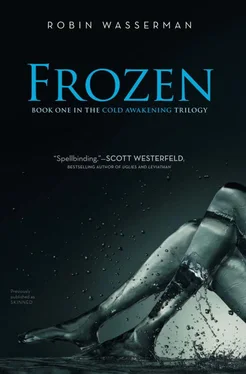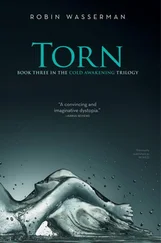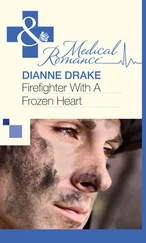“So what?”
“So I think you two have a lot in common,” Sascha said. “It might help to share your experiences, get her perspective on things. Plus she’s eager to meet you.”
“All we have in common is this .” I looked down at the body. My body. “And you keep telling me that this doesn’t mean anything.”
“You don’t want to meet her.”
Sascha’s brilliant intuitive powers never ceased to amaze. “No.”
“Maybe we should talk about why.”
“Maybe not.”
Sascha crossed her arms. I wondered if I’d finally managed to break through the professional placidness, if Sascha was about to prove she had an actual personality, one that could get irritated when a bitchy “client” pressed hard enough.
Not a chance.
“Let’s try something new,” she said with an I-have-a-secret-plan smile. “Why don’t you tell me what you want to talk about.”
“Anything?”
“Anything. As long as it’s something.”
I didn’t want to talk. That was the point. Now that I had my voice back, I had nothing to say.
“Running,” I said. It was the first thing that popped into my head. Maybe because I thought about it all the time. How it would feel to run in the new body. Whether I would be slower or faster, whether I would find a new rhythm. What it would mean to run without getting out of breath; whether I could run forever. They told me the body would simulate exhaustion before it had reached its limits, a gauge to prevent total system failure, but no one knew exactly what those limits would be.
“You’re a runner?” Sascha asked, faux clueless. It was her default mode; at least when she wasn’t acting the all-knowing wisdom dispenser. She knew I was a runner, because she had a file that told her everything I was. Everything she thought mattered, anyway.
Was a runner.
I nodded.
“Do you miss it?”
I shrugged.
“You run on an indoor track or…”
“Outside,” I said immediately.
Sascha leaned forward, as she always did when she thought she was about to crack my code. “That’s unusual,” she said. “Someone your age, spending so much time outside.”
“It’s required.” But that wasn’t true, not really. Yes, we were all forced to spend a few hours a week outdoors, but for most people, that was the end of it. Five whiny hours shivering in the grayish cold, then back inside. It was one way I’d always been different. The only way.
“What do you like about it?” Sascha asked. “Running.”
“I don’t know.” I paused. She waited. “It felt good. You know. Especially a long run. You get an adrenaline high. Or whatever.”
“Have you tried it? Since the procedure?”
I shook my head. There was supposedly a track somewhere in the building, but I hadn’t bothered to find it.
“Why not?”
I looked down. The hands were sitting in my lap. I stretched one of them out along my thigh. It felt good to be able to move again. After almost a month of rehab, I didn’t even need to think about it most of the time; the hands clenched themselves into fists when I wanted them to, the fingers closed around balls and hairbrushes and tapped at keyboards just like real fingers. They registered the fabric on my legs—standard issue, hideously ugly BioMax thermo-sweats. Not that I needed thermo-regulation now, not when I had it built in, but that’s what they had, so that’s what I wore, because it was easier than buying all new clothes, and my old clothes no longer fit.
“What would be the point?” I said finally.
“The point would be to feel good.”
In my head I laughed. The mouth spit out something harsh and scratchy. Laughing was tricky.
“You disagree?” Sascha asked.
“I guess it depends on your definition of ‘feel.’”
“You’re processing emotional and physical sensation differently now; that’s natural,” Sascha said, oozing understanding. Not that she could ever actually understand. “But your programming is designed to emulate the neurotransmitters that stimulate emotional response. Your emotions are the same, even if they don’t feel that way.”
“I feel the same, even if I feel different? Is that supposed to make sense?”
My father would kill me if he ever knew I was talking to an authority figure like this, even a figure with such questionable authority as Sascha.
“When I get angry, my stomach clenches,” Sascha said. “I feel sick. When I’m upset, my hands tremble. Sometimes I cry. What happens when you’re upset?”
I said nothing.
Which was pretty accurate.
“Without a somatic response, it’s natural that the emotions will seem weaker to you,” she said. “More distant. But the stronger the emotion, the more ‘real’ it may feel, partly because you’ll be too consumed with the powerful emotion—or sensation—to analyze all the things you’re not feeling. And as your mind relaxes into old patterns and finds new ones, as it will —”
“I’ll be my old self again. Right.”
“Lia, haven’t you been able to find any advantages to your new body?”
That had been my “homework” from the other day: design a pop-up for the download process, complete with catchy slogan, and a list of fabulous advantages available to every download recipient. Sascha thought it would tap into my creativity skills.
It turned out I didn’t have any.
“I can link in whenever I want,” I muttered. But that wasn’t new. For my sixteenth birthday, I’d finally gotten a net-lens, which meant that once I got used to jamming a finger in my eye, I could link with a blink, just like the pop-ups said. Could superimpose my zone and my av over blah reality, type on a holographic keyboard that only I could see. But the pop-ups didn’t mention how it made you nauseated and made your head burn. Now I had a built-in net-lens, and migraines weren’t an issue.
Hooray for me.
“Good,” Sascha said, nodding. “Anything else?”
“I guess no more getting sick.” Not that anyone got sick much these days, anyway. Not if you could afford the med-tech, and if you couldn’t, well, you had bigger problems than the flu. “And if I get hurt, it won’t, you know. Hurt. Much.” There would be pain, they’d told me that. Of all the sensations, the neurochemistry of pain was the easiest to mimic, the best understood—and the most necessary. Pain alerts the brain that something is wrong, call-me-Ben had said. An alarm you can’t ignore . So there would be pain, they had promised, and I knew it was possible, because I’d felt it when I was still trapped in the bed, when it seemed to crawl out from inside my head. But out of the bed, back in the world, pain was just as distant as everything else.
“You’re beautiful,” Sascha said. “That’s something.”
I was beautiful before.
“And then there’s the big thing,” Sascha prompted. “A lot of people would envy you for that. If the government allowed it, a lot of people might even download voluntarily.”
“Doubtful.”
“To never age…” Sascha looked dreamy, and her hand flickered to the corner of her left eye, where the skin was pulled taut. “Some might call that lucky. Miraculous, even.” She couldn’t be more than seventy, I decided, since after that even the best doctors left behind a few stretch marks—and no younger than thirty, because you can always tell when someone’s had their first lift-tuck, and she definitely had. First, second, and probably eighth, I guessed. No one so lame could be any younger than that.
Call-me-Ben was the one who’d taught me how to back up my memories each night, preserving that day’s neural adjustments and accretions in digital storage—“just in case.” He’d had the same dreamy look as Sascha. They all did, when the subject came up.
Читать дальше












